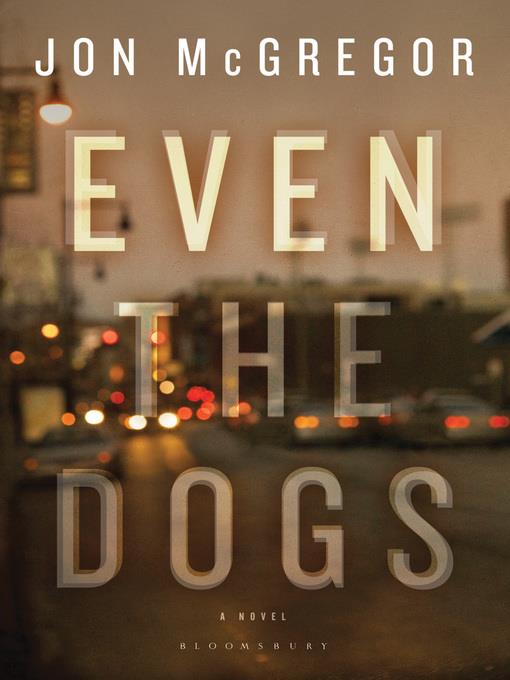
Even the Dogs
A Novel
- اطلاعات
- نقد و بررسی
- دیدگاه کاربران
نقد و بررسی

October 19, 2009
This mercifully short third novel from McGregor (If Nobody Speaks of Remarkable Things
) is told from the various perspectives of a loosely connected band of down-and-outers linked by Robert, a hopeless alcoholic whose wife has taken their daughter and left him alone in his flat, which has since become a gathering place for the members of McGregor's cast. Robert's death sets in motion the novel's events—it would be misleading to call it a plot—starting with the police taking away his body. For the most part, we're with Danny, whose past gradually comes to light via an expletive-laced narration that verges on incoherence: his foster home upbringing; his relationship with Robert's daughter, Laura, whom Danny is trying to contact; and of course, his heroin addiction, which provides much of the novel's subject matter. In the process, we learn about the group that frequented Robert's flat, a motley crew who provide plenty of sordid stories. But the central mystery—how did Robert die?—goes nowhere, and the spliced-in set pieces that describe the stages Robert's body undergoes on its way to eventual cremation don't do any favors for this misfire.

November 15, 2009
British novelist McGregor (So Many Ways to Begin, 2007, etc.) takes a bleak look at some drug addicts.
Robert's decomposing body has been found by the cops in his apartment in an unidentified English city. In this plotless novel, the ramifications of his death serve as a focal point. The middle-aged alcoholic slob loved company. The deal was that druggies could hang out and shoot up at his place if they kept him supplied with food and drink; Robert was not himself a user. The puzzle is why his body was left to rot. Where had the addicts gone? The author eventually provides a grisly explanation, but his main purpose is a portrait of Robert's ruined peers. Heroin is their drug of choice, but they'll settle for anything else in its absence:"Full-time job just keeping the rattles off." We get to know Danny best. Well-meaning but feckless, he discovered Robert's corpse but failed to call the cops. First he had to score, then find Laura, Robert's grown daughter. Hers may be the saddest story. Her mom left Robert when Laura was seven. She had two unsuccessful reunions with her father and became an addict herself, scabbed and scarred and filthy like the rest of them, clinging to pipedreams of rehab. There is power in McGregor's description of this desperate subculture, but the repetition becomes numbing. There's nothing new about portrayals of the heroin scene, and a habit does not necessarily make for interesting characters. These junkies are just plain dull, as is Robert. An invisible Greek chorus of addicts follows his autopsy and inquest; homicide is ruled out. The bureaucratic efficiency of these proceedings contrasts sharply with the helter-skelter drug world, but Robert's lonely cremation yields only a so-what shrug.
A few experimental touches don't compensate for the lack of a compelling narrative.
(COPYRIGHT (2009) KIRKUS REVIEWS/NIELSEN BUSINESS MEDIA, INC. ALL RIGHTS RESERVED.)

December 15, 2009
Booker Prize nominee McGregor ("If Nobody Speaks of Remarkable Things") returns with this third novel told through a series of broken narratives. At the center of the book is alcoholic Robert, whose body is found shortly after the Christmas holiday. Robert's only companions before dying were a group of heroin addicts who often took refuge in Robert's apartment in exchange for food and company. (McGregor tells their stories as well.) Representing Robert is a group of spirits who act as a chorus filling in details and watching over his body, thereby providing him a sort of eulogy. Most effective is the narrative about Robert and his daughter, Laura, who left Robert with her mother as a child but who as an adult heroin addict found refuge in her father's apartment years later. VERDICT McGregor's stream-of-consciousness prose, written partly in dialect, is challenging, but those who enjoyed Hubert Selby Jr.'s "Requiem for a Dream" will value the style and the subject matter.Cristella Bond, Muncie, IN
Copyright 2009 Library Journal, LLC Used with permission.

January 1, 2010
In his third novel, two-time Booker nominee McGregor follows a band of ghostly drug addicts, who act as a Greek chorus as they witness their friend Roberts body being carted out of his squalid apartment and taken to the morgue. Among them is Danny, an abused victim of the foster-care system; Steve, a traumatized war vet; and Heather, a once-popular groupie now an aging wreck. Robert himself gave into alcoholism years ago after his wife left him, taking their young daughter with her. Paralyzed by their desertion, he continued to drink himself into oblivion while serving as the toastmaster to neighborhood addicts, who, in turn, exhaust themselves in an endless round of scoring, eating, scrounging up money, and scoring again. With its complex flashback structure, fractured inner monologues, and grim characters, this novel makes for dense reading. Yet McGregor succeeds in paying homage to the dispossessed and the hopeless, who live and die on the margins of society.(Reprinted with permission of Booklist, copyright 2010, American Library Association.)




دیدگاه کاربران